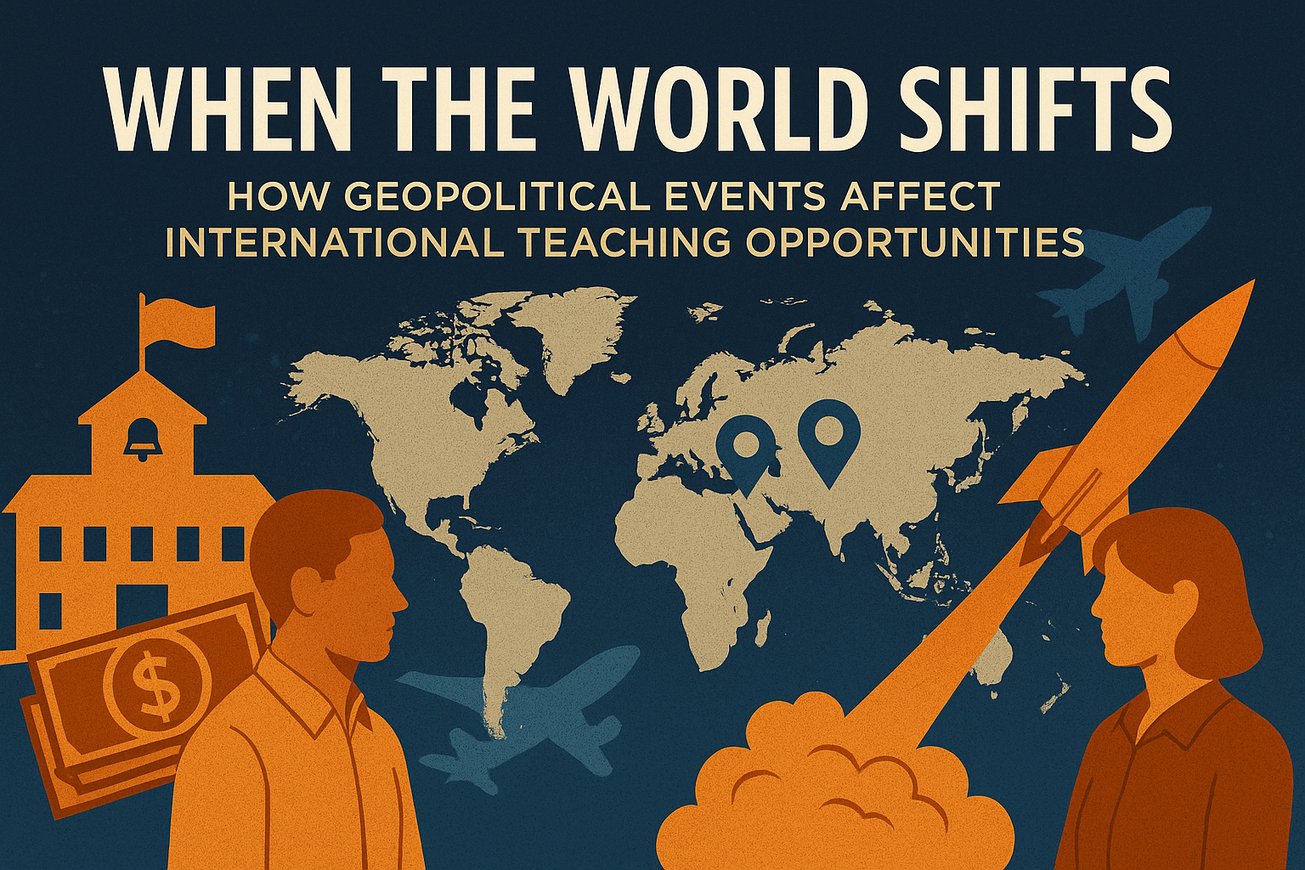When the World Shifts: How Geopolitical Events Affect International Teaching Opportunities
2025-06-24 · By Admin

A day ago, Iran launched missiles at the U.S. military base in Qatar. No casualties were reported — Qatar’s air defenses intercepted them — but for a few tense hours, the region held its breath. Flights were diverted, embassies issued alerts, and international teachers (Us included), both on the ground and en route, began asking difficult questions:
-Am I safe?
-Should I still go?
-Will my contract change?
-Can I back out?
If you’ve worked in international education for long enough, you know this isn’t an isolated moment. It’s part of a broader, unspoken reality we all live with: geopolitical events — war, unrest, sanctions, even diplomacy breakdowns — can turn a promising contract into an impossible decision overnight.
Safety Is Never Just a Footnote
In a perfect world, job offers would be about pedagogy, leadership, curriculum, and community. But for many of us, especially when working in high-tension regions, the question quietly hanging in the background is: Will I feel safe here? And I don’t mean just physically safe — though that matters; I mean the emotional toll of living on edge. The pressure of having to weigh a career opportunity against a State Department advisory. The reality that a last-minute missile strike — even one with no casualties — can shake your entire sense of stability.
It’s an exhausting layer of complexity we rarely talk about openly. But we should.
Here’s just a few examples of what often happens in the wake of a geopolitical jolt like the recent Qatar incident:
-A teacher, newly hired, starts to doubt their move.
-Their partner isn’t comfortable. Their family has questions.
-Maybe the embassy issues a warning or the insurance policy won’t cover that region anymore.
-They back out. Or ask to delay. Or ghost the contract altogether.
For the school, that means starting the recruitment process all over again — often weeks before term starts. For the teacher, it means guilt, confusion, and usually financial loss.
Now here’s where it gets even murkier: sometimes schools do offer something extra — a “hardship allowance” or “danger pay”, but these terms aren’t always clearly defined. One teacher may get it; another, hired two months earlier, might not. Some schools quietly increase packages after an incident; others leave things unchanged, expecting staff to honour commitments regardless. For teachers navigating this space, it’s impossible to know what’s normal, what’s fair, or what’s negotiable, because no one shares that information publicly.
The Ripple Beyond the Headlines
What happens in Qatar doesn’t stay in Qatar.
In international education, no country exists in isolation. A missile intercepted in Doha can shake confidence in Dubai. A diplomatic standoff in Tehran can lead to families pulling out of school placements in Muscat. One teacher’s decision to delay or withdraw can quietly become dozens, as WhatsApp groups light up with shared concerns. It’s not just about proximity — it’s about perception; and perception spreads fast.
School leaders in the region suddenly find themselves not just managing classrooms, but managing anxiety — fielding emails from nervous new hires, negotiating release clauses, or reassuring existing staff and parents that they’re monitoring the situation closely. Recruiters, meanwhile, may quietly remove certain listings or bump up promotion in “safer” destinations. They might even encourage candidates to “wait a few weeks and see” — knowing full well that delayed decisions can mean losing staff for the next academic year entirely.
Even countries untouched by the specific event can feel the impact.
When a region is lumped together in news cycles or travel advisories, nuance gets lost.
A job in Abu Dhabi might be ten hours from the epicentre of unrest — but to a teacher abroad, it’s all just “the Middle East.”, a school in Istanbul might feel completely safe — but try explaining that to a partner reading foreign office alerts in London. When fear overrides information, schools lose staff, teachers miss opportunities and students lose continuity.
This is why transparency matters so deeply — not just in salary figures, but in stories, in timelines, in lived context. Because the ripple effects don’t stop at contracts — they touch real lives, real decisions, and real communities.
This is why I built Wondering Staffroom — because the information international educators actually need isn’t neatly listed in brochures or job ads. It lives in conversations, in Slack groups, in late-night WhatsApp chats between friends and we need to pull that knowledge into the open.
These are the questions and problems teachers face when deciding to choose a school or accept an offer and I hope Wondering Staffroom will help real people make real decisions — and this is exactly what we’re starting to surface, slowly but surely, through the data, submissions, and stories on this site.
So what can we do?
If you’re a teacher: ask the hard questions before you sign. If your instinct is saying something feels off — listen to it!
If you’re a school: be transparent. Offer flexible policies and upfront communication. Let people know how you’ll support them if things change.
And if you’ve been through one of these moments — whether you stayed, left, or had to make a tough call — share your experience. It could genuinely help someone else navigate their own decision with more clarity and confidence.
-> Browse salary packages to see how offers change by region
-> Use Analytics to track patterns across roles and countries
-> Submit your own package to add context others can trust
-> Follow updates and discussion on Twitter @WonderingSRoom
Next steps
Useful next steps and related pages.
Browse salary packages
Filter and compare real anonymous submissions from international teachers.
Explore country salary guides
Find salary expectations, benefits and advice by destination.
Submit your package anonymously
Add your salary and benefits to strengthen the dataset for everyone.
Back to News
Read more updates, features and transparency stories.
